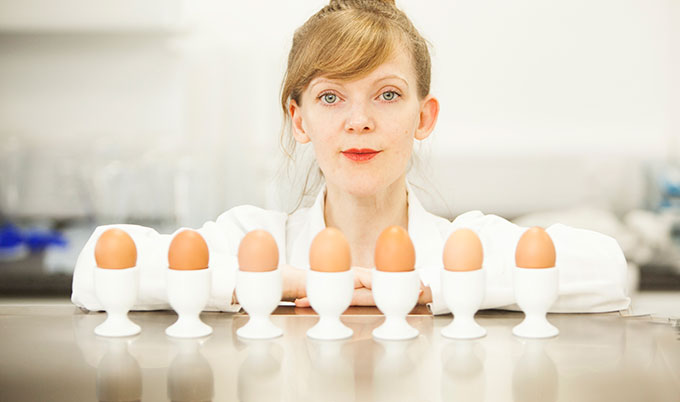sunshine eggs
Sunny-side up: how 'Sunshine Eggs' could boost vitamin D levels
Published on: 19 December 2016
As the shortest day of the year approaches, scientists at Newcastle University believe that eggs could hold the answer to the lack of sunlight in the UK.
Low vitamin D levels
During summer months, the main source of vitamin D for people in the UK is from the action of the sun on our skin. But during the winter, sunlight doesn’t contain enough of the UVB type radiation for our skins to be able to make the essential vitamin.
And while it’s possible to get a small amount of vitamin D from some natural food sources such as oily fish, red meat and eggs, it is difficult to get the recommended amount of vitamin D from food alone. As a result, many people in the UK have low levels of vitamin D, which helps the body use calcium from the diet and is essential for good bone strength.
Earlier this year, Public Health England (PHE) published new dietary guidance on vitamin D recommending that adults and children aged four years and above should have 10 micrograms (mcg) of vitamin D every day.

Major study
Scientists at the Institute for Agri-Food Research and Innovation (IAFRI) at Newcastle University are now conducting a major study to assess whether ‘Sunshine Eggs’ – eggs enriched in vitamin D - could increase people’s levels of the vitamin.
PhD student Estelle Rickelton, who is leading the research, said: “Many people in the UK have low levels of vitamin D in winter, when the height of the sun is too low for our bodies to make it. Certain groups are known to be at increased risk of vitamin D deficiency, including ethnic groups with dark skin and those who have limited exposure to sunlight. Vitamin D levels in the North are typically 20% lower than in the South.
“Since we can’t rely on our diets, or the winter sun, to provide adequate amounts there is an urgent need to explore enriched foods as a way to increase vitamin D intake. Eggs are a natural source of the vitamin, so we think that ‘Sunshine Eggs’ that are enriched with vitamin D could offer a convenient way for people to increase their intake of this essential vitamin.
“The vitamin D in eggs is derived from the hens’ diet and there is well established evidence now that feeding hens additional vitamin D is both very safe and results in eggs with higher vitamin D.”
Volunteers needed
Healthy Caucasian and South Asian people aged 18 – 35 years are being asked to volunteer to take part in the study, which will be conducted late January to early April 2017. The study will involve consuming up to seven eggs a week for 8 weeks.
Volunteers will make two visits to the NU-Food Food and Consumer Research Facility at Newcastle University, where they will have their body measurements and blood pressure taken. A small blood sample will also be taken and a simple handgrip strength test performed to assess the effect of consuming ‘Sunshine Eggs’ on vitamin D status, bone metabolism and muscle function.
Dr Tom Hill, Senior Lecturer in Nutrition, Newcastle University, added: “The new government recommendations on vitamin D represent a major shift from the previous advice which assumed that sunlight provided all the vitamin D we need.
“Vitamin D supplements could in theory provide people with the vitamin D they need but this approach alone would not be sufficient to address low vitamin D levels. Many people don’t take supplements for various reasons so there is attraction in exploring the potential for enriching a well-established cheap, natural and nutritious food such as eggs which have been part of the British diet for years.”
Participants in the study will have the freedom to choose how many eggs they consume in one sitting and how they are cooked. A set of recipes is also being offered to help those taking part.
Anyone interested in participating or who would like more information should email the research team at sunshine.eggs@ncl.ac.uk
Vitamin D factfile
- Vitamin D regulates the amount of calcium and phosphate in the body to keepbones, teeth and muscles healthy.
- A lack of vitamin D can lead to bone deformities such as rickets in children, or a condition called osteomalacia in adults.
- The Recommended Daily Amount of vitamin D is 10 micrograms (mcg) per day for adults.
- Taking too much vitamin D is unhealthy and can damage the kidneys and the heart due to high levels of calcium in the blood (hypercalcaemia). NHS experts say not to exceed taking more than 100mcg of vitamin D a day.
- Good food sources of vitamin D are oily fish (such as salmon, sardines, herring, and mackerel), red meat, eggs and fortified foods such as breakfast cereals.
- Sunlight is the best source of vitamin D, but always remember to cover up or protect your skin if you are out in the sun for long periods to reduce the risk of skin damage and skin cancer.
- More information about vitamin D is available on the NHS Choices website



